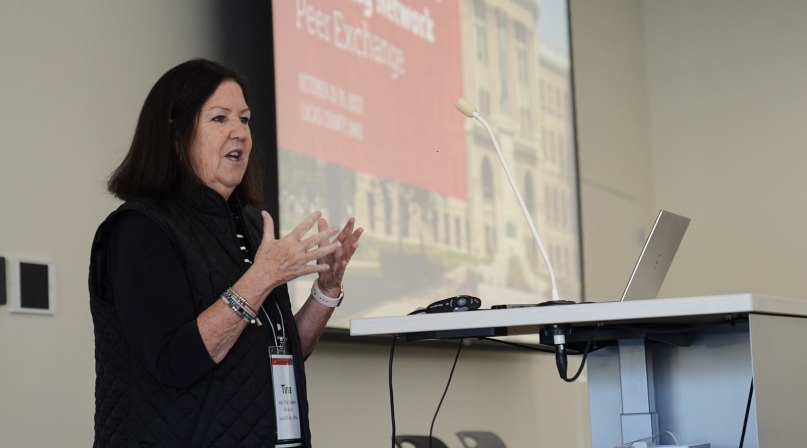Justice Peer Learning Network explores keeping mentally ill from jail
Upcoming Events
Related News

Key Takeaways
Reducing the number of people with mental health problems who end up in jail was the topic at a recent gathering of county officials in Lucas County, Ohio.
County leaders participating in NACo’s County Justice Peer Learning Network got together in October to learn more about how Lucas County supports justice-involved community members with mental health conditions.
Lucas County was chosen as the site of the peer exchange due to a county-wide effort to reduce the number of people with behavioral health conditions in contact with the criminal legal system.
The county is also working to increase connections to community services, collect and use data to inform decision-making and advance racial equity.
Learn more
Those efforts start with the county commissioners.
“We are the behavioral health advocates for the county,” said Commissioner Tina Skeldon Wozniak.
“We want to continue Lucas County’s momentum to have real reform so that those who need help can get help. We don’t want people cycling in and out of our criminal justice system.”
Leveraging data
Attendees learned about a local Criminal Justice Coordinating Council that provides an integrated criminal justice information system.
It also governs NORIS (Northwest Ohio Regional Information System), a central repository for criminal justice information that helps manage and improve data quality, sharing and integration and cross agency/jurisdiction workflow.
The system serves as a model for data-sharing and integration across the country.
Lucas County’s data-sharing and dashboards provide critical insight into the local justice and behavioral health systems to inform decision-making and strategies to reduce incarceration and understand disparities and needs.
Continuum of care
Peer exchange participants toured the Zepf Center, a certified community behavioral health clinic, that provides behavioral health and vocational services to community members with severe and persistent mental illness.
The center also offers crisis stabilization services and accepts walk-ins and law enforcement drop-offs.
To support community members who live with serious and persistent mental illness and whose crimes are driven by that untreated illness, the Felony Forensic Assertive Community Treatment (FACT) team provides an alternative to incarceration at the sentencing phase of a felony-level case.
The program connects defendants to a team of professionals who provide intensive supervision and comprehensive, wrap-around services.
“Through several innovative initiatives, Lucas County seeks to improve outcomes for those with mental illness through reducing inappropriate incarceration, increasing access to services and enhancing public safety,” said Judge Lindsay Navarre, Common Pleas Court in Lucas County.
Public safety
While working to reduce the overuse and misuse of incarceration, Lucas County is also enhancing programs and practices to ensure justice-system involved residents have access to services that improve well-being and reduce future harmful behavior.
The Opportunity Project offers pretrial felony defendants support from a a social worker, who is paired with a public defender, to identify needed services and develop a plan for engaging the individual in those services.
Between January 2018 and June 2022, the program has supported more than 1,400 participants and nearly 74 percent have successfully remained in the community without re-arrest.
Lucas County’s collaborative and data-driven programs, practices and policies have increased access to appropriate services for community members with behavioral health conditions and right-sized the local criminal legal system.
This peer exchange was generously supported by the MacArthur Foundation.
Attachments
Related News

Information-sharing bill could protect court workers
The Countering Threats and Attacks on Our Judges Act could provide more than 30,000 state and local judges with access to security assessments, best practices and a database of threats made against colleagues in the justice field.

After historic winter storms, counties assess response
Counties in states that rarely receive much winter weather are assessing their responses to the January storm that left many covered in snow and ice.

California counties fight agricultural crime
Sheriffs' offices and prosecutors in California's central valley make specific efforts to prevent and prosecute crimes against the agricultural community.